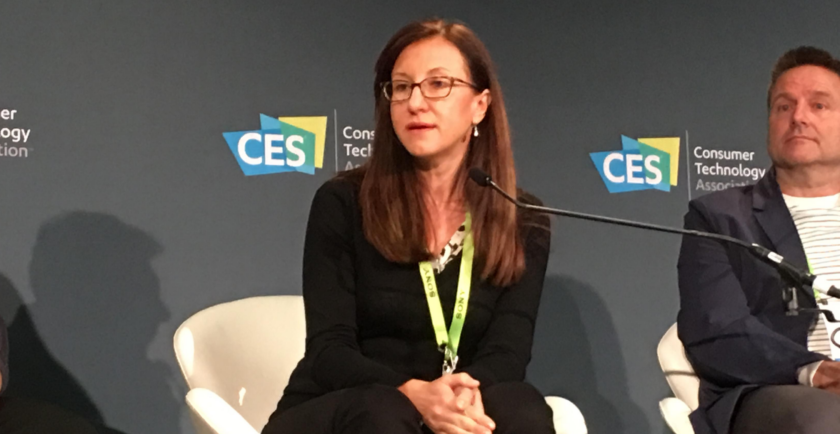M+E Connections

CES 2019: AR/VR Stands to Get Boost from 5G, Verizon Ventures Director Says
Story Highlights
LAS VEGAS – Further underscoring the significant presence that 5G is having at this year’s Consumer Electronics Show (CES), Kristina Serafim, director at Verizon Ventures, predicted that the next-generation wireless service will likely benefit augmented reality (AR) and virtual reality (VR) offerings.
“Connectivity will enable a lot of experiences that we just don’t see today, and we are not aware of today,” she said Jan. 7 during the Digital Hollywood conference session “AR/VR/MR Think Tank: Top Technology and Entertainment Companies.” She added: “We don’t know what’s going to be developed because of 5G, because of the connectivity” enhancements offered by it.
Already, “4G was a critical part” of the success of the AR game “Pokemon Go” and its mass market adoption, she pointed out. Although she pointed out she didn’t have a crystal ball to know exactly what AR and VR experiences will be made possible by 5G, she said: “It’s clearly going to be immersive experiences. What are they going to look like? We’re seeing the glimpse of it now. There’s a certainty that it will improve AR, VR, immersive, mixed reality [MR] interactivity. What it’s going to look like we [have] yet to see.”
Verizon Ventures has already invested in AR and VR technology companies including The Void and continues to look for more opportunities in the space, she pointed out.
Other AR/VR companies that the sister company of Media & Entertainment Services Alliance (MESA) member Verizon Digital Media Services has invested in to date include 8i.
Today, these experiences are “very much camera first and screen first,” Neil Parris, AR/VR entertainment partnerships lead at Google, said during the conference session. He explained: “When you think about the camera first and you’re talking about augmented reality, in order to augment reality you need to understand reality. And so that’s a little bit about the perception and the immersion kind of pillars that we’re working against. And so the tech to understand the world and have a semantic understanding of what every object is and where planes are is really hard. And that’s something that we’re trying to tackle with Google Lens. And I think once you have that kind of tackled, you can start to layer in the immersive experiences that give context to the experiences that you’re seeing in front of you.”
Google Lens is an artificial intelligence-based image recognition mobile app that his company announced during the Google I/O conference in 2017.
The combination of the “technology mechanisms” and “consumer discovery mechanisms” made possible by devices using AR and VR are both important components, according to Tony Parisi, head of AR/VR Brand Solutions at video game developer Unity Technologies, a San Francisco company best-known as the creator of the Unity game engine.
“A lot of us think that, at some point, this camera is just always on and always looking at everything and able to recognize more and more stuff around us,” Parisi said. He added: “That’s going to trigger the discovery of amazing content delivered down a fat 5G pipe as easily as someone sends you a link and you find stuff on YouTube right now. So, we haven’t gotten to that point. But the next three to five years is about building that infrastructure.”









